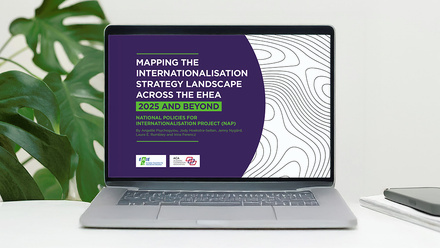Perceptions of international students: Key findings of the XV ESNsurvey

In 2023, the Erasmus Student Network conducted the 15th ESNsurvey. Since its first edition in 2005, the survey has inspired international students to share their perceptions of mobility experiences. This student-led initiative empowers student voices and contributes significantly to the success of data collection. The ESNsurvey has been instrumental in shaping the ESN’s international student representation and advocacy efforts, aimed at enhancing access to and experience of mobility programmes, and gauging their impact.
The XV ESNsurvey
The ESNsurvey is a European-wide research project implemented by the Erasmus Student Network. It covers various topics related to international student mobility and is one of the largest student-led initiatives of its kind. In this edition, the ESNsurvey reached out to three different target audiences, each of whom were enrolled in Higher Education during the academic years 2021–2022 and/or 2022–2023:
-
Exchange students (78.40%)
-
Full-degree students (8.15%)
-
Non-mobile students (13.45%)
The survey collected a total of 22,775 responses.
The XV ESNsurvey is a comprehensive research project that provides a holistic analysis of students’ mobility experiences. In this blog, we will delve into some of the most interesting and relevant key findings.
The reflections on the Erasmus+ priorities
The programme priorities are one of the novelties introduced in the 2021-2027 edition. The priorities defined by the 2021-2027 period are the following: inclusion and diversity, digital transformation, the environment and the fight against climate change, and participation in democratic life. Overall, students believe in the successful implementation of these priorities. However, the survey reveals clear differences between students' perceptions of priorities and the actions they take to implement them. The successful implementation of Erasmus+ priorities does not always align with students' attitudes and behaviours, highlighting a gap between their aspirations and their actions.
This trend has been observed in other ESN projects and initiatives, such as the Green Erasmus project, which highlights the fact that ecological concerns do not necessarily translate into more sustainable practices. This specific concern is reaffirmed in the XV ESNsurvey, where international students showed a preference for flying as their preferred mode of travel.
Nevertheless, one priority stands out as scoring higher and showing a consistent success rate across the entire survey: the Inclusion and Diversity priority. More than just a positive result, this serves as a key indicator of how to increase student satisfaction with higher education institution's services.
Motivational factors for mobility
To fully understand why students are not going abroad, we must delve into their motivations and pull factors, and understand who influences them to pursue international experiences. Additionally, comparing the perceptions among our three target audiences is crucial, as conclusions can only be drawn by contrasting the perspectives of those who have been abroad with those who have not.
For exchange students, the primary motivational factors for going abroad are "engaging with different cultures" and "gaining knowledge of cultures," whereas for full-degree students, they are "enhancing career prospects" and "networking." Pull factors for exchange students include the "affordability of the host city," the "academic reputation of the host institution," and the "recognition of the degree abroad." Similarly, full-degree students prioritise factors such as "the ability to speak the language of instruction at the destination university," the "academic reputation of the hosting institution," and the "affordability of the hosting city."
Both target audiences recognise recommendations from other students as crucial for their decision to go abroad, underscoring the significance of peer-to-peer support in their decision.
Comparing these results with non-mobile data reveals a key trend: financial constraints emerge as the primary barrier for non-mobile students, followed by language barriers. Understanding the perceptions of the three target audiences is crucial not only to ensure a smooth experience for international students but also for the correct implementation of internationalisation strategies in Higher Education Institutions, which must be adapted to each audience's unique set of fundamental needs.
Main issues encountered abroad
One of the primary objectives of the ESNsurvey is to identify areas for improvement in current mobility opportunities for students, particularly those that can be addressed through proposed policy changes to relevant actors involved in mobility programmes. A key question posed to students in recent editions of the ESNsurvey revolves around the challenges encountered abroad. It comes as no surprise that the three main issues highlighted are "insufficient funds to cover the cost of living", "difficulties in finding affordable accommodation", and "problems related to course recognition". Unfortunately, 42% of survey respondents indicated that these issues contributed to feelings of anxiety and stress among international students.
On the topic of funding, we have identified two main trends: accommodation and food expenses typically account for approximately 70% of the total budget for exchange students going abroad, and there are persistent issues with late payments of grants. Despite some improvements noted in the latest ESNsurvey, more than 60% of respondents still report receiving grants late.
Currently, opportunities for international students are increasing. For example, there are innovations such as the new proposal for the European Degree Label and we are seeing an increase in the number of European University Alliances. Therefore, it is crucial that we elevate students’ concerns, especially those related to funding, in discussions concerning the Multifinancial Framework of the European Union and the new Erasmus+ Programme.
By comparing how students felt before and after they went abroad, we observed that this experience makes them feel more connected to their own country, to Europe, to the European Union and to the world at large.
Erasmus+ students as promoters of the European way of life
During European Election years, it becomes increasingly important to understand how engaging in mobility opportunities shapes participants' perceptions of Europe and the European Union. By comparing how students felt before and after they went abroad, we observed that this experience makes them feel more connected to their own country, to Europe, to the European Union and to the world at large. Additionally, we asked them if they intended to vote in the next EU elections, and around 78% had already expressed interest in participating in June 2024. The top three concerns raised in the survey were digital transition, Europe’s role in the world and freedom of movement.
To further explore the results and determine if participation in international mobility, particularly through the Erasmus+ programme, is a decisive factor in making students more engaged in society and more likely to participate in the upcoming EU elections, the ESN launched a breakout report from the ESNsurvey titled Participation in learning mobility as a driving force to change the European Union.
Conclusions
The XV ESNsurvey aimed to enhance understanding and improve students' overall mobility experience. It sought to identify the barriers faced by both mobile and non-mobile students participating in mobility programmes, with a focus on supporting measures such as administration and financing, as well as student's academic and socio-cultural experiences. This blog only summarises some of the key findings from the XV edition of the ESNsurvey. For a broader view, you can find the preliminary report of the XV ESNsurvey here. The Erasmus Student Network team is working on the final report of the survey and corresponding breakout reports. These are expected to be published in September 2024.






